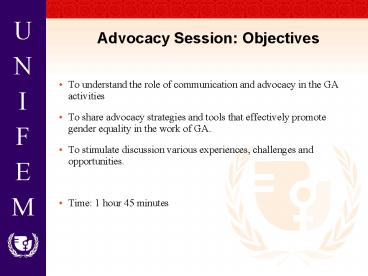Advocacy Session: Objectives - PowerPoint PPT Presentation
1 / 8
Title:
Advocacy Session: Objectives
Description:
To share advocacy strategies and tools that effectively promote gender equality ... Katharina Samara, HapInternational (15 minutes) ... – PowerPoint PPT presentation
Number of Views:43
Avg rating:3.0/5.0
Title: Advocacy Session: Objectives
1
Advocacy Session Objectives
- To understand the role of communication and
advocacy in the GA activities - To share advocacy strategies and tools that
effectively promote gender equality in the work
of GA. - To stimulate discussion various experiences,
challenges and opportunities. - Time 1 hour 45 minutes
2
Outline of panel speakers
- Presentations 1 hour
- Hodan Addou, Facilitator (7 minutes)
- Katharina Samara, HapInternational (15 minutes)
- Yvonne Sesonga, Femmes Africa Solidarity (15
minutes) - Jennifer Miquel, Regional GBV Taskforce (8
minutes) - Mariko Sato, UNHABITAT (15 minutes)
- Jamille Bigio, UNOCHA
- Group Work and Discussions 45 minutes
3
- Advocacy as one of the key ToRs of GAs.
- Does you advocacy strategy highlight a common
commitment to gender equality and the essential
role played by women in all aspects of
humanitarian work? - Do your advocacy strategies, messages, and the
images used support gender equality? Women, Men,
Girls and Boys? - Do the messages emphasize the importance of
gender equality in overcoming poverty and
suffering?
4
- Key Questions for Advocacy strategy
- Advocacy for what purpose?
- Advocacy to secure political and financial
support for gender equality and womens human
rights in Humanitarian Action? - Advocacy to build awareness of communities,
targeting policy makers, law makers and
enforcement agents? - What is your message Define your message simple
and single messages work best. - What do people already know? and what do they not
know? What information will be useful? - Who are your target audience? Prioritize
audience? Who will be left out because of your
messages, tools and strategies used?
5
- Key Questions for Advocacy strategy
- Pre-testing Have you got your messages right?
Have you tested them first? Are they culturally
appropriate? - Participation Is strategy taking into earlier
feedback? Who is involved in development of
advocacy strategy? - Define your Message clarity, can it effectively
understood? - What media will be used to communicate your
messages? - Timing and coordination Multi channels of
communication? - Scale How is it going to be carried out?
- Capacity Building what capacities exist?
- Evaluation
- Source Communications and Development A
practical guide. (DFID, 1999)
6
- What opportunities are available to the GAs to
advocate for GE? - Information exchange meetings
- GenderNets
- Needs Assessments
- Trainings and workshops
- Contingency planning workshops
- Consolidated appeal processes
- UNCTs, Senior Management Meetings, etc.
- Advocacy and Awareness raising Tools?
- Single issue campaigns
- Information fliers
- media advocacy or campaigns short films, videos,
theatre - Broadcast media radio and television
- Networking
- Information and communication technology web
portal
7
- Evidence-based advocacy
- Research findings can form the basis of advocacy
initiatives - Participatory appraisals, assessments, ME can
produce evidence to present to key stakeholders - Ownership
- experience shows that when individuals targeted
are made to feel that they own the idea being
propagated. - Presentation
- Working in a flexible manner, might be achieved
more than by pushing a particular agenda which
many will feel is not appropriate to their
agencies or countries.
8
Partners for Advocacy
- Non-Governmental organizations
- Have lots of experience and a greater capacity to
conduct advocacy and media work. - UN agencies and other Inter-governmental
organizations - GenderNets, communication officers in agencies
(UNIC), - Local OCHA offices
- Media
- Media contacts
- Government (relevant line ministries, ministry of
gender and family, women parliamentarians, - Local civil society organizations (CSOs)
- pushing from below, achieve more
- Effective partner when doing policy-based
communication work - Wealth of experience, ownerships































